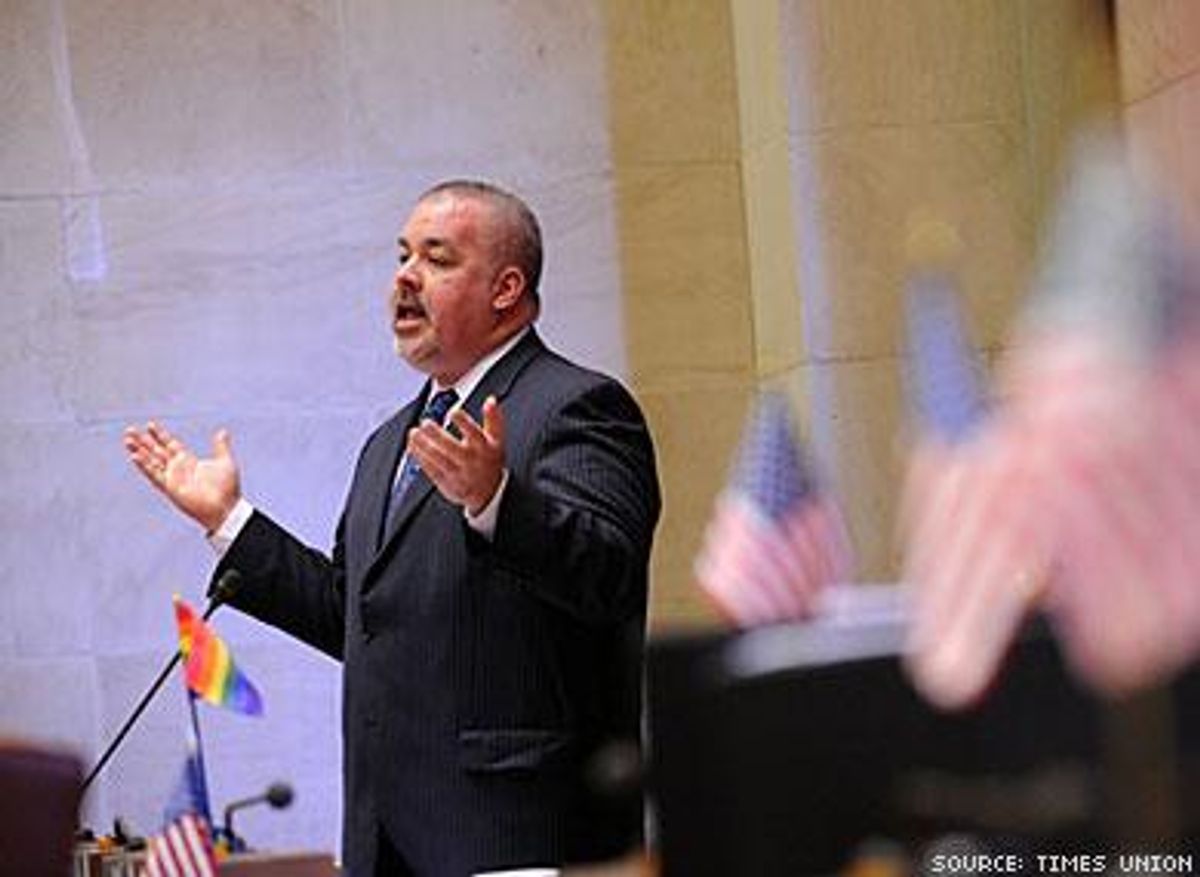
CONTACTStaffCAREER OPPORTUNITIESADVERTISE WITH USPRIVACY POLICYPRIVACY PREFERENCESTERMS OF USELEGAL NOTICE
© 2024 Pride Publishing Inc.
All Rights reserved
All Rights reserved
By continuing to use our site, you agree to our Private Policy and Terms of Use.
The New York state assembly passed the marriage equality bill for the fourth, and perhaps the final, time on Wednesday. The measure still awaits consideration by the senate.
Lawmakers in the Democratic-controlled chamber passed the bill by a bipartisan vote of 80 to 63 after four hours of impassioned but largely civil debate that went from the late afternoon into the night. Personal stories and blunt references to politics punctuated a discussion driven by questions about religion and the evolution of marriage as a social institution.
Daniel O'Donnell, the openly gay lawmaker from Manhattan, sponsored the bill with a record 68 sponsors, including three Republicans. He led the bill to passage three previous times, once in 2007 and twice in 2009.
"This is an immense step toward achieving true equality for all here in New York," said O'Donnell in a statement after the vote. "I am very proud that under Speaker Silver's strong leadership and with his unwavering support, we in the Assembly have powerfully voiced our deep-seated belief in equality and rejected legalized discrimination yet again. Since we first passed marriage equality four years ago, the need for this law has only grown, with same-sex couples in New York facing daily discrimination from our state. This must end."
O'Donnell said last week that he expected the bill would pass with a slimmer margin of approval than in May 2009, when it passed by a vote of 89 to 52 with five Republicans voting in favor. Democrats lost 10 seats in the last election and a handful of seats remain vacant in the assembly.
Passage of the bill brought the potential to nudge the senate, where Republicans, who hold the majority, met for four hours on Wednesday but made no decision about whether to bring the bill to the floor for a vote before the session ends on June 20. Senate majority leader Dean Skelos, whose party holds a 32-30 edge, said he and his members would continue their closed-door deliberations on Thursday. Currently, 29 Democrats and two Republicans, James Alesi and Roy McDonald, have said they would vote yes for the bill, which means that one more Republican is needed to pass the measure.
Assemblymembers voted Wednesday after speaker Sheldon Silver sent a "message of necessity" to Gov. Andrew Cuomo to circumvent the three-day waiting period required for the bill to age. Cuomo submitted the Marriage Equality Act to the legislature for consideration on Tuesday after repeatedly indicating that he did not want to see a "one-house" bill or a vote that would fail in the senate as it did in 2009.
"The vote by the state assembly has moved New York one step closer to making marriage equality a reality," said Cuomo in a statement. "I applaud these legislators' prompt and courageous support on this measure, which will finally allow same-sex couples the freedom to marry and provide them with hundreds of rights that others take for granted. I commend Speaker Sheldon Silver for his leadership and Assemblyman Daniel O'Donnell for his tireless work fighting for equality. We are on the verge of a pinnacle moment for this state."
The governor's program bill submitted Tuesday includes language based on the state's existing law to exempt private religious institutions that do not want to solemnize same-sex weddings or provide facilities such as catering halls for the celebrations. At least one senate Republican, Greg Ball, said Wednesday that he would like to see more substantial carveouts to protect religious institutions or else he would not vote for the legislation.
Religion hovered throughout the debate of the marriage equality bill on the assembly floor on Wednesday. Some said their faith prevented them from supporting the measure, while others said there should be no conflict between religion and a civil marriage bill.
"I wish it wasn't in the book," said Dov Hikind, who waved a copy of the Torah on the assembly floor. "The Torah's so clear on this subject," he said. "There is no choice for me. And I am open-minded."
In the most visually startling moment of the debate, the Brooklyn lawmaker held a poster of Lady Gaga as he criticized the marriage equality campaign for using celebrities to promote the issue. The pop star called out one undecided state senate Republican, Mark Gristanti, at a concert this year.
Deborah Glick, the first openly gay member of the state legislature, later addressed the separation of church and state head on, saying, "You do not put your hand on the Constitution and swear to uphold the Bible."
Harry Bronson, an openly gay lawmaker from upstate New York, said that the legislation would have no impact on anyone's personal faith, explaining, "I would not try to convince anybody to change their religious beliefs being a religious person myself."
Still others urged colleagues to think about changing attitudes and their legacy as lawmakers.
Naomi Rivera, who represents the same South Bronx area as state senator Ruben Diaz Sr., the only Democrat to oppose the bill in his chamber, said she had received thousands of messages against the bill, but she would yes for the sake of her 11-year-old child.
"I've been given the responsibility to help pave the way for the future generation for my son," she said.
References to the high-stakes politics surrounding the marriage equality vote entered the debate at times, especially at it related to the senate, which failed to pass the bill in 2009. Undecided Republicans, some of whom voted no two years ago, have been warned they would lose the influential endorsement of the Conservative Party of New York State if they vote for the bill.
Joel Miller, one of three Republicans who sponsored the bill, called the Conservative Party "an anti-woman, anti-labor and anti-gay organization." He represents the Hudson Valley, home of Stephen Saland, who has been mentioned as a possible Republican yes vote in the senate.
Miller, who has voted for the bill since 2007, was joined again on Wednesday by Janet Duprey and Teresa Sayward. Sayward spoke about the discrimination against her gay son near the end of the debate and said, "This is a conservative issue."
Fried Thiele of the Independence Party joined the three Republicans in voting for the bill.
Nancy Calhoun, a Republican who voted against the bill, responded to comments from Glick about the tyranny of the majority by expressing her frustrations about being in the minority party in the assembly. She said to the Democrats across the aisle, "Everyone of you are the majority and you have been oppressive to us," while suggesting that some lawmakers "votes are for sale" on the issue.
Donald Miller mentioned the tragic story of Alan Turing, the gay British computer inventor subjected to electroshock therapy, who later took his own life. That provided no reason for the Republican to vote for the bill, however.
"We need to pursue repentance and to seek forgiveness for the terrible things that we do to each other," said Miller. Then he added, "I am not as compassionate as the God that I serve. I am ill-equipped to tell him that he's wrong about this."
The drive to pass marriage equality legislation in New York is being led by Cuomo, a popular Democratic governor who has made the issue one of his three legislative priorities this session. During the assembly debate, Democrats hailed his leadership while some Republicans suggested the lobbying had been excessive, with Steven McLaughlin making reference to "visits and arm-twisting by the governor."
The governor delivered votes from three previously undecided Democratic senators on Monday, which shifted the political burden of the marriage equality bill to senate Republicans. On Wednesday, three Democratic assembly members also changed their position, with Nelson Castro, Karim Camara and Nick Perry, all from New York City, voting yes.
"Things change," said Perry of Brooklyn, who voted against the bill three previous times, as he cast his first yes vote to applause in the chamber.
From our Sponsors
Most Popular
18 of the most batsh*t things N.C. Republican governor candidate Mark Robinson has said
October 30 2024 11:06 AM
True
After 20 years, and after tonight, Obama will no longer be the Democrats' top star
August 20 2024 12:28 PM
Trump ally Laura Loomer goes after Lindsey Graham: ‘We all know you’re gay’
September 13 2024 2:28 PM
60 wild photos from Folsom Street East that prove New York City knows how to play
June 21 2024 12:25 PM
Melania Trump cashed six-figure check to speak to gay Republicans at Mar-a-Lago
August 16 2024 5:57 PM
Latest Stories
Pornhub's search trends expose America's naughty coping mechanisms to Trump's win
November 12 2024 4:45 PM
Lala Ri takes a new path, 'leaving the drag behind'
November 12 2024 4:32 PM
You won't believe the meaning of The Rock's beige handkerchief in 'GQ' cover
November 12 2024 3:51 PM
Kentucky Gov. Andy Beshear: Democrats don't have to abandon LGBTQ+ people to win
November 12 2024 3:33 PM
The tragedy of 4B: Scissoring out the patriarchy, but not scissoring each other
November 12 2024 3:23 PM
Meet Payton, Cooper Koch's hot (and gay) twin brother
November 12 2024 3:05 PM
This week on The Advocates: A gay astrophotographer makes history, again
November 12 2024 1:41 PM




















































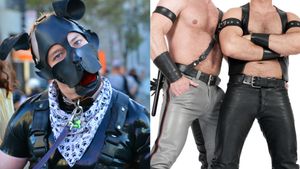








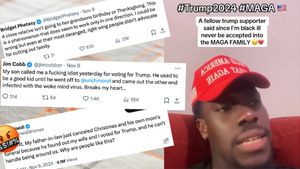












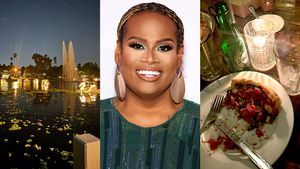
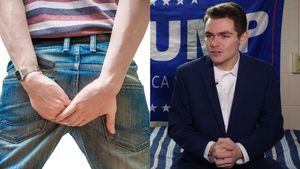





Grammy-nominated Chappell Roan has four-word response to management split story